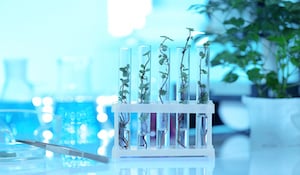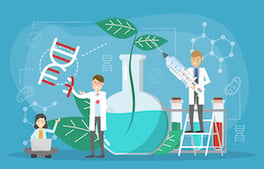
Since it's discovery, CRISPR has been one of the most discussed and debated topics in the scientific community, partly due to the overwhelming amount of potentially landmark applications for it. CRISPR has many potential uses for plant agriculture, animal husbandry and human health. This report focuses on the benefits that CRISPR can bring to plant agriculture.
CRISPR (Clustered Regularly Interspaced Short Palindromic Repeats) is adapted from the naturally occurring “immune system” of bacteria. When bacteria are attacked by bacteriophages, which are a virus like organism, the bacteria use CRISPR to incorporate part of the foreign genetic material into their own DNA. If another bacteriophage with sufficiently similar genetic material attacks, CRISPR induces CRISPR associated enzymes, or “Cas”, to slice up the foreign DNA. We’ll refer to this system as “CRISPR” throughout this report for brevity.
 The global market for CRISPR technology was over USD $1 billion in 2020 and is estimated to grow to over USD $6 billion by 2028, at a CAGR of over 20%. With so many opportunities for companies and institutions to apply this technology, it becomes important from a tech transfer standpoint to explore the leaders of this industry.
The global market for CRISPR technology was over USD $1 billion in 2020 and is estimated to grow to over USD $6 billion by 2028, at a CAGR of over 20%. With so many opportunities for companies and institutions to apply this technology, it becomes important from a tech transfer standpoint to explore the leaders of this industry.
Our report on the top 10 companies covers a wide variety of areas, from patents to partners, and from commercial to financial activity. We have also included a section on ESG (environment, social and governance) activities for each company, where that information is available. As there are currently no widely accepted standards for ESG, we have chosen to note these activities as self-reported by each company. We have included a preview of one of these reports below.
Corteva, Inc.
Chestnut Run Plaza 735
PO Box 80735
Wilmington, DE 19805-0735
United States
Commercial Activity
In this profile, we review Corteva (formerly Dow Agrosciences). Corteva purchased Pioneer Hi-Bred International Inc in 2019. Corteva develops innovative seeds along with products that protect against weeds, insects and other pests, and diseases. Corteva has highlighted the application of CRISPR technology as part of its research in these areas.
Patenting Activity
Corteva Agriscience LLC was formerly known as Dow Agrosciences LLC; it is in turn owned by Corteva. Many more patents and applications are under the name of Pioneer Hi-Bred International Inc. We’ve combined the numbers from both entities in our review. These two entities have 12,293 patents/applications between them, of which 6,736 are US filings. Of the total filings, 407 are related to CRISPR, of which 90 are US filings. There has been a steady publication rate of such US filings in general and those related to CRISPR for at least the past 5 years.
Partnerships
Both entities have multiple co-owned patent applications. We counted at least 36 separate universities and research institutions with co-ownership for US filings and at least 4 universities with co-ownership in patents/applications related to CRISPR. Corteva, along with the Broad Institute, also recently granted a non-exclusive license to Dutch vegetable seed breeder Bejo. As the agreement announcement noted, Corteva is committed to open innovation, including collaborations with outside partners.
Financial Analysis
Corteva is a publicly traded company. Corteva was spun out of DowDuPont in June 2019, so financial information is limited to the subsequent period. Its stock price has increased significantly since mid-2020. It reported a negative EBIT in 2019, and a positive EBIT in 2020 and the portion of 2021 for which figures are available. Of the 23 analysts following the stock as of December 2021, 15 recommended it as a “strong buy” or “buy”, 6 as “hold” and 2 as “underperform”.
ESG
Corteva has announced 14 sustainability goals for 2030, which also include ESG goals more broadly. A number of these goals relate to helping farmers internationally, including several specific initiatives that support women farmers, including in India and Kenya. Other goals include initiatives to improve and protect land, and for increased environmental sustainability in agriculture.
Download our full report here!



